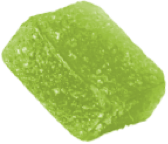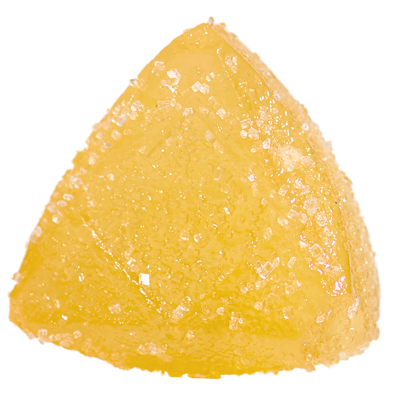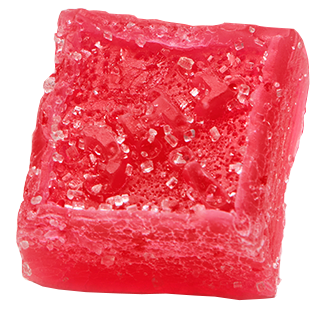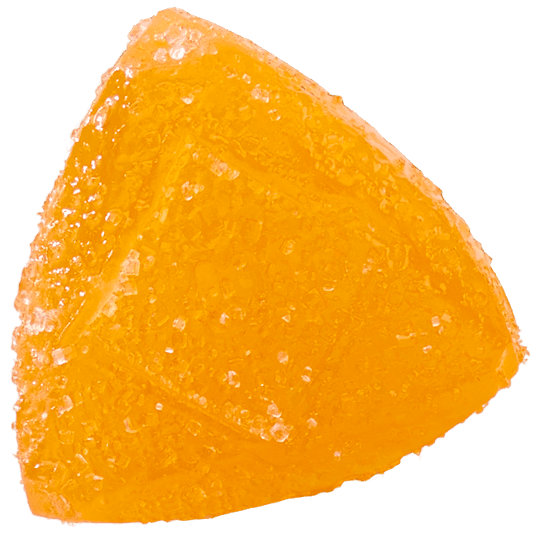What Is Delta-8-THC?

Picture it: you’re visiting friends or family in a state where cannabis isn’t legal yet – let's go with Texas. You’re on your way to see the latest mind-bending Christopher Nolan movie, or maybe for a beautiful hike through Big Bend National Park, and you wish out loud that you could take an edible to enhance your experience. “Don’t worry,” says your proud Texan cousin/bestie/brother-in-law/Lyft driver. “I have Delta-8 gummies. They’re totally legal, and you can buy them online!”
Maybe you've found yourself in a situation like this one – or maybe you’ve heard the buzz around Delta-8 in some other way. But what exactly is Delta-8-THC? How is it different from regular THC? Will it get you high? How can Delta-8 actually be legal? And most importantly, is it safe?
We've got the answers to all these questions and more! So before you pop that random internet edible, please read on.

HOW MANY KINDS OF THC ARE THERE?
The cannabis plant in its natural, neutral state only produces one form of THC: Delta-9-THCA. The A denotes that this molecule is the acidic form of THC. To get rid of that A, we have to do something called “decarboxylation,” which requires high heat. When you light up a joint, you are decarboxylating THCA cannabinoids – removing a carboxyl group from their molecular structure – which turns into regular, non-acidic Delta-9-THC.
Delta-9 is the most commonly known and experienced THC molecule. It’s what you get when you smoke, vape, or dab. Its effects are fast-acting, usually fairly light and cerebral, and last about 2-4 hours.
Things get wacky when you ingest Delta-9-THC via traditional edibles. When that happens, the Delta-9 is metabolized in your liver, where it’s converted into a different molecule called 11-Hydroxy-THC. 11-Hydroxy results in more potent, longer lasting effects, often referred to as “a body high.” You can read more about the difference between these two THCs (and why Wana Quick Gummies are one of the only ways to achieve a Delta-9 high without smoking) HERE.
As far as intoxicating THC molecules you can consume straight from the plant, without significant chemical intervention, Delta-9 and 11-Hydroxy are pretty much it. But once you take things out of nature and into the laboratory, things get more complicated. That’s where Delta-8 comes in.
WHAT IS DELTA-8-THC?
In terms of molecular structure and effects, Delta-8-THC is very similar to Delta-9, though many report feeling less potent effects when they consume it.
Here’s the catch: the cannabis plant does not produce Delta-8-THC. It can only be created in a lab, where chemists can alter the atomic structure of Delta-9-THC or CBD molecules to synthetically produce this strange little spin-off cannabinoid.

HOW IS DELTA-8-THC LEGAL?
Delta-8 is what we’ll call a “loophole cannabinoid.” To understand why, you have to know the difference between “hemp” and “marijuana.” Marijuana = a cannabis plant containing more than .3% Delta-9-THC. Hemp = a cannabis plant containing no more than .3% Delta-9-THC.
The sale and distribution of marijuana is illegal at the federal level. But the sale and distribution of hemp is not. As we’ve covered, Delta-8 is made by synthetically altering the atomic structure of CBD or Delta-9-THC molecules. As long as those source molecules are derived from hemp rather than marijuana, this process is not illegal.
Is this what legislators had in mind when they created the 2018 Farm Bill that federally legalized hemp? Almost certainly not. But so far there have been no meaningful efforts to close this loophole. That means selling hemp-derived Delta-8 online or in other non-dispensary locations technically follows the letter of the law, if not quite the spirit.

IS DELTA-8 SAFE?
The short answer is: nope! Delta-8 molecules in their pure, uncontaminated form might be ok, but it hasn’t really existed long enough for us to study its long-term effects. More urgently, the process by which Delta-8 molecules are synthesized – usually using harsh agents like sulfuric acid – often produces unknown, undesirable, downright unsafe chemical byproducts.
And here's the wild thing: there is ZERO regulatory oversight of Delta-8 manufacturing processes in most states. It does not require a special license or pedigree or even education to create these molecules. Anyone with access to a lab and some fairly basic scientific knowledge can do it. Walter White was a chemist too, remember?
We should also note: Delta-8 is not the only alternative THC molecule being synthesized in labs. See also Delta-10, Delta-7, HHC, HHCO, THCO, THCP, and JWH18 (also known as “Spice”). Some of these molecules are known to have dangerous side effects – Spice, for example, can cause hypothermia and respiratory issues. None of them are required to adhere to any kind of standardized safety practices.

IS DELTA-8 WORTH IT?
The ability to order weed online – particularly for our friends still living in locations where they can't access regulated THC products – may feel like a dream come true. But no amount of convenience is worth risking your health.
Are there safe, reputable Delta-8 manufacturers out there? Maybe! But without ANY regulatory checks and balances to keep consumers safe, it’s impossible to tell the good from the bad. No matter what the marketing materials may say, taking a Delta-8 gummie you’ve ordered online is not too far off from accepting an unmarked pill from a sketchy dude outside the bar.
Until better legislative protections are in place around Delta-8, it’s safest to buy your cannabis at licensed dispensaries, where the products are subject to standardized lab testing and other regulatory conditions. We promise it’s worth playing it safe on this one... Christopher Nolan can wait til you’re back from your trip.
Find a Store






